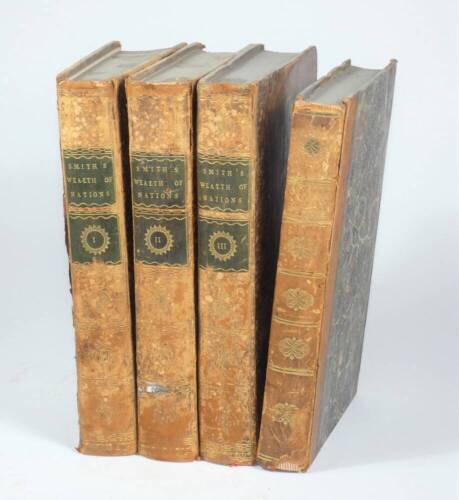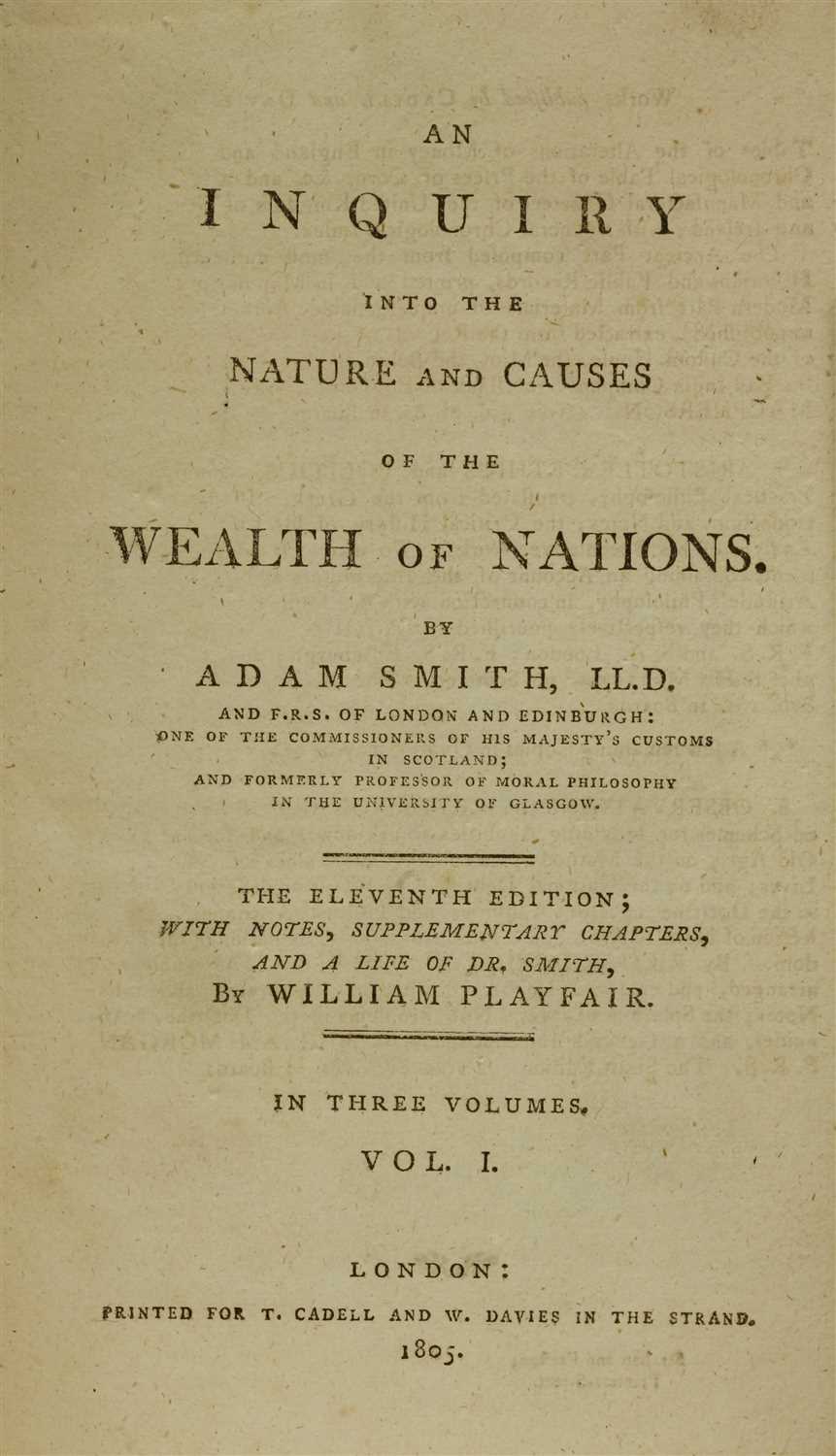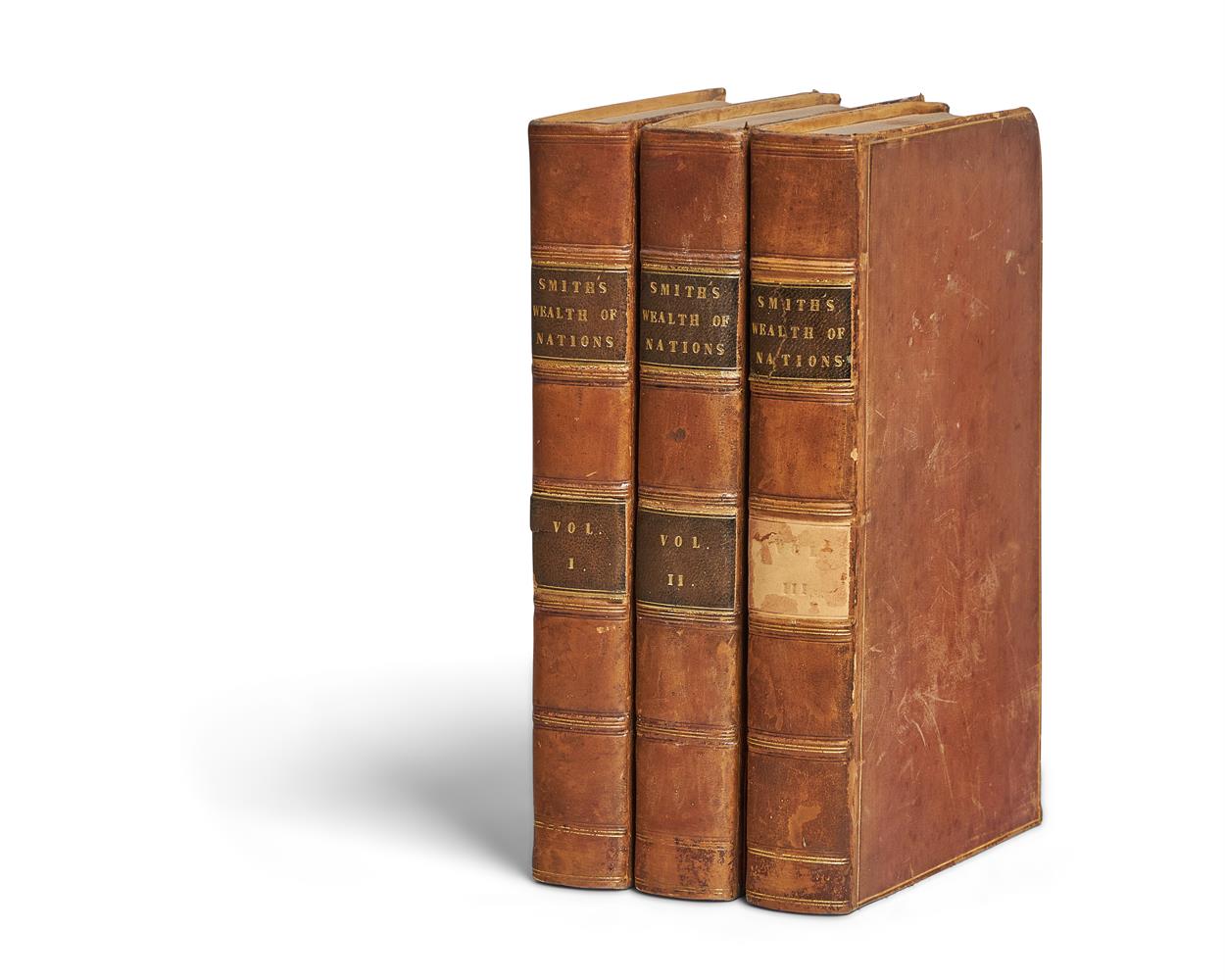SMITH, Adam (1723-1790). An Inquiry into the Nature and Causes of the Wealth of Nations . London: W. Strahan and T. Cadell, 1776. An outstanding copy, in exceptionally fine condition and with remarkable provenance, of the first edition of Adam Smith’s Wealth of nations . ‘The first and greatest classic of modern economic thought’ (PMM), this work contains the first major expression of the theory of free trade. Smith propounds individual liberty and the accumulation of wealth, while arguing strongly for moral fairness and a duty to society. He describes a system of natural liberty and justice which strives towards improvement in the living standards of the population at large, equating higher wages with a healthier and more productive workforce. He asserts that the limits to growth are political, not economic, and sets out principles to guide legislators. Smith also provides a history of economic theory, an historical analysis of the wealth of nations, including China, and forecasts for the future. The first edition was immediately acknowledged as an extraordinarily important publication, and sold out within six months of publication. This copy has the distinction of having been owned and annotated by a remarkable protagonist of the British ‘long eighteenth-century’, the classicist and philosopher of aesthetics Richard Payne Knight. Knight, who acquired this copy in the samy year as the publication, knew the Wealth intimately. Indeed so thoroughly did he embrace its tenets in writing his own The progress of civil society (1796, in verse) that a contemporary critic called this work little more than a ‘versification’ of the Wealth , as well as of Montesquieu’s Spirit and one or two other milestones of the Enlightenment. The marginalia, perhaps two hundred, concentrated in Book IV and V, evidence Knight’s keen engagement with Smith's weighing of strengths and weaknesses of competing mercantilist and physiocratic models of political economy, and with the history and role of taxation. They bear witness to Knight's first encounter with notions that were to become the building blocks of his own concept of history and civilization. Smith had first modelled the progress of nations towards increasing wealth in his Lectures on jurisprudence , based on a four-stage advancement; but it is in the Wealth that he points out the complexity and contradictions of such theory. Knight pays close attention to Smith’s arguments as well as cases – both would converge, at a less literal and deeper level than in the didactic poem, into the most influential of his works, An Analytical Inquiry into the Principles of Taste , 1805. Two volumes, quarto (276 x 220mm). With the half-title in vol. 2, final blank leaf in vol. 1, adverts printed on final verso in volume 2. and, as often, cancels M3, Q1 (cancellation stub preserving the upper margin in full length), U3, 2Z3, 3A4 and 3O4 in volume 1, and D1 and 3Z4 in volume 2 (light spotting on title, half-title, final 2 leaves and very occasionally elsewhere.) Contemporary, possibly Scottish, tree calf, flat spines decorated in gilt with contrasting morocco lettering- and numbering-pieces, marble end-papers (corners lightly rubbed, one spine head fractionally weak, a few minor surface abrasions to the sides). Provenance : Richard Payne Knight (1751-1824; classicist, archaeologist, numismatist; his ownership inscriptions on half titles, dated 1776, and numerous marginalia to text in vol. 2). Having been profoundly impressed by the Grand Tour to Italy and the European continent he made from 1767, Richard Payne Knight became a keen connoisseur of all things classical, particularly Homeric texts, sculpture, coins and artifacts. In 1814 he became a trustee of the British Museum, to which eventually he bequeathed his collection of artifacts. Knight's first books, The Worship of Priapus and Symbolical Language of Ancient Art and Mythology , were groundbreaking in tracing continuity of cultural manifestations through
SMITH, Adam (1723-1790). An Inquiry into the Nature and Causes of the Wealth of Nations . London: W. Strahan and T. Cadell, 1776. An outstanding copy, in exceptionally fine condition and with remarkable provenance, of the first edition of Adam Smith’s Wealth of nations . ‘The first and greatest classic of modern economic thought’ (PMM), this work contains the first major expression of the theory of free trade. Smith propounds individual liberty and the accumulation of wealth, while arguing strongly for moral fairness and a duty to society. He describes a system of natural liberty and justice which strives towards improvement in the living standards of the population at large, equating higher wages with a healthier and more productive workforce. He asserts that the limits to growth are political, not economic, and sets out principles to guide legislators. Smith also provides a history of economic theory, an historical analysis of the wealth of nations, including China, and forecasts for the future. The first edition was immediately acknowledged as an extraordinarily important publication, and sold out within six months of publication. This copy has the distinction of having been owned and annotated by a remarkable protagonist of the British ‘long eighteenth-century’, the classicist and philosopher of aesthetics Richard Payne Knight. Knight, who acquired this copy in the samy year as the publication, knew the Wealth intimately. Indeed so thoroughly did he embrace its tenets in writing his own The progress of civil society (1796, in verse) that a contemporary critic called this work little more than a ‘versification’ of the Wealth , as well as of Montesquieu’s Spirit and one or two other milestones of the Enlightenment. The marginalia, perhaps two hundred, concentrated in Book IV and V, evidence Knight’s keen engagement with Smith's weighing of strengths and weaknesses of competing mercantilist and physiocratic models of political economy, and with the history and role of taxation. They bear witness to Knight's first encounter with notions that were to become the building blocks of his own concept of history and civilization. Smith had first modelled the progress of nations towards increasing wealth in his Lectures on jurisprudence , based on a four-stage advancement; but it is in the Wealth that he points out the complexity and contradictions of such theory. Knight pays close attention to Smith’s arguments as well as cases – both would converge, at a less literal and deeper level than in the didactic poem, into the most influential of his works, An Analytical Inquiry into the Principles of Taste , 1805. Two volumes, quarto (276 x 220mm). With the half-title in vol. 2, final blank leaf in vol. 1, adverts printed on final verso in volume 2. and, as often, cancels M3, Q1 (cancellation stub preserving the upper margin in full length), U3, 2Z3, 3A4 and 3O4 in volume 1, and D1 and 3Z4 in volume 2 (light spotting on title, half-title, final 2 leaves and very occasionally elsewhere.) Contemporary, possibly Scottish, tree calf, flat spines decorated in gilt with contrasting morocco lettering- and numbering-pieces, marble end-papers (corners lightly rubbed, one spine head fractionally weak, a few minor surface abrasions to the sides). Provenance : Richard Payne Knight (1751-1824; classicist, archaeologist, numismatist; his ownership inscriptions on half titles, dated 1776, and numerous marginalia to text in vol. 2). Having been profoundly impressed by the Grand Tour to Italy and the European continent he made from 1767, Richard Payne Knight became a keen connoisseur of all things classical, particularly Homeric texts, sculpture, coins and artifacts. In 1814 he became a trustee of the British Museum, to which eventually he bequeathed his collection of artifacts. Knight's first books, The Worship of Priapus and Symbolical Language of Ancient Art and Mythology , were groundbreaking in tracing continuity of cultural manifestations through















Testen Sie LotSearch und seine Premium-Features 7 Tage - ohne Kosten!
Lassen Sie sich automatisch über neue Objekte in kommenden Auktionen benachrichtigen.
Suchauftrag anlegen